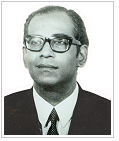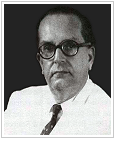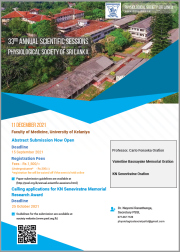Carlo Fonseka Oration
 In memory of the late Prof. Carlo Fonseka, Professor of Physiology of the Faculty of Medicine, University of Colombo, the Physiological Society of Sri Lanka organises the Annual Carlo Fonseka memorial oration to be delivered by a distinguished physiologist, scientist or clinician..
In memory of the late Prof. Carlo Fonseka, Professor of Physiology of the Faculty of Medicine, University of Colombo, the Physiological Society of Sri Lanka organises the Annual Carlo Fonseka memorial oration to be delivered by a distinguished physiologist, scientist or clinician..
Biography of of Professor Carlo Fonseka
Prof. Carlo Fonseka is a legend in Physiology in Sri Lanka. From the time of obtaining a PhD in Physiology from the University of Edinburgh in UK in 1966,
His contribution to the field of Physiology has been colossal. He is considered as one of the best lecturers in Physiology because of his innate ability to articulate the most difficult physiological concepts in a manner any layman could understand taking examples mostly from his own experiences and also from everyday observations. He was the Professor of Physiology of the Faculty of Medicine, University of Colombo since 1982. He then became the Founder Dean of the newly established Faculty of Medicine of the University of Kelaniya at Ragama.
He fervently assisted Professor Valentine Basnayake to inaugurate the Physiological Society of Sri Lanka (PSSL) on the 29th of May 1987 at the New Building Lecture Theatre of the Faculty of Medicine in Colombo. He immensely contributed to uplift the scientific principles at PSSL meetings as well as among a large number of undergraduate and postgraduate students, and followers of him. In his charismatic way, he was extremely successful in popularizing science and in particular, physiological principles among the general public. He was one of the most sought after speakers in any meeting on any topic ranging from science, physiology, medicine, music, songs, drama, philosophy, politics etc. He was a prolific writer too.
Past Orations:
| Year | Orator | Title |
| 2022 | Prof Panduka Karunanayake | Rediscovering Physiology in Contemporary Medicine: The Foundational Insights of Claude Bernard |
| 2021 | Dr Asoka Dissanayake | A nomadic physiologist and his experiences and views on online teaching at the Wayamba Faculty of Medicine |



 Prof. Arthur Cecil Elsley Koch was the first Ceylonese Professor of Physiology. In memory of late Prof. A.C.E. Koch, the Physiological Society of Sri Lanka organises the Annual ACE Koch memorial oration to be delivered by a distinguished physiologist, scientist or clinician.
Prof. Arthur Cecil Elsley Koch was the first Ceylonese Professor of Physiology. In memory of late Prof. A.C.E. Koch, the Physiological Society of Sri Lanka organises the Annual ACE Koch memorial oration to be delivered by a distinguished physiologist, scientist or clinician.




